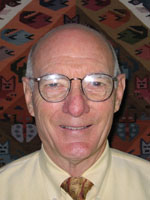
Joe W. Hightower
Rice University
Catalyzing a Discipline
When I arrived in 1959 as a Ph.D. candidate at Johns Hopkins University, I knew essentially nothing about catalysis. That fall I had the privilege of taking a stimulating graduate course on the subject taught by the late great Paul H. Emmett and knew immediately that this would be my field of research. Over the next three years I plowed through the catalysis literature, and the names of principal researchers from around the world became firmly implanted in my mind. Occasionally some of the giants in the field would pass through our laboratories at Hopkins where I might meet them, but most remained “names” to me.
Early in my final year of study Professor Emmett told me all about the Gordon Research Conferences and invited me to attend the Catalysis Conference he and Keith Hall were organizing for the summer of 1963. Without a doubt attending that conference was the highlight of my career. I met almost all the people active in my field, with many transformed from “names” into friends and colleagues. Little did I know that as a result of making those connections, I would spend a postdoctoral year with the late Charles Kemball in Edinburgh, who presented a paper at the conference, and another three years doing research with Hall, who had chaired the conference, at the Mellon Institute before launching my own career at Rice University.
I had the honor of chairing the Catalysis Conference at Colby-Sawyer College in 1973, serving as a trustee on the GRC board, and serving in 1981 as board chair during GRC’s fiftieth anniversary. During twenty-five years of active service to GRC I missed only one Catalysis Conference. As a trustee I also was able to monitor a few Gordon Conferences in other areas, which introduced me to current research in fields outside catalysis. The dynamic breadth of GRC topics covers the waterfront of important fields in science.
The unique format of Gordon Conferences encourages candid presentations of novel ideas in a nonthreatening, confidential environment. Highly speculative theories frequently generate new research projects that test their validity. At the suggestion of Bob Eischens I invited R. T. K. Baker from the United Kingdom to give an exciting talk on his pioneering work with the electron microscope that showed the explosive growth of carbon filaments during catalytic reactions with small particles of transition metals. This talk resulted in Baker’s move to the United States where he has continued his research for many years.
Every year I attended the conference I was fascinated by the people who occupied the front rows in the lecture hall and never failed to present challenging questions to the speakers. At the risk of omitting many important researchers, these included Emmett, Hall, Herman Pines, Bob Burwell, Val Haensel, Sol Weller, Sam Siegel, John Sinfelt, John Peri, Dick Kokes, Wolfgang Sachtler, Charlie Plank, Frank Ciapetta, Pierce Selwood, Bert Farkas, Werner Haag, Alex Mills, Hans Benesi, Jack Lunsford, and several others, all of whom have served as chair of the Catalysis Conference.
I will never forget the social benefits of the Gordon Conferences. Technical presentations were held in the morning and evening, while “free afternoons” provided time for one-on-one discussions about research and extracurricular activities. Some of my favorite experiences, when not talking about catalysis, were jogging, playing tennis, swimming in Lake Sunapee, climbing Mt. Kearsarge, and enjoying an off-campus lunch with Alex Cruickshank. It was at the Catalysis Conferences that my wife met many of my colleagues, and, of course, the lobster dinners on Thursday evenings were a gourmet’s delight. One of my social contributions was to write words to favorite classic songs for a sing-along after dinner.
I was pleasantly surprised to learn that many of my Catalysis Conference colleagues enjoyed this activity.
Through discussions at GRC other national and international catalysis organizations were born, including the International Congress on Catalysis, the North American Catalysis Society, and many local catalysis clubs like the one I belong to in the Southwest. Many of these organizations would never have materialized without the platform for discussion provided by the Gordon Research Conferences. Long live the GRC!